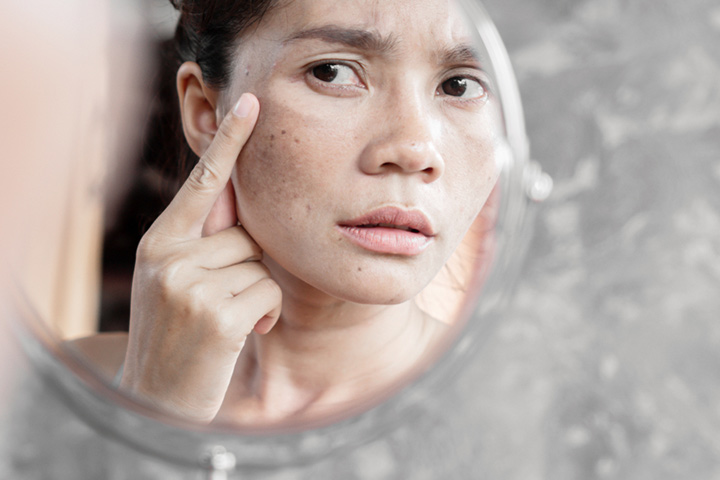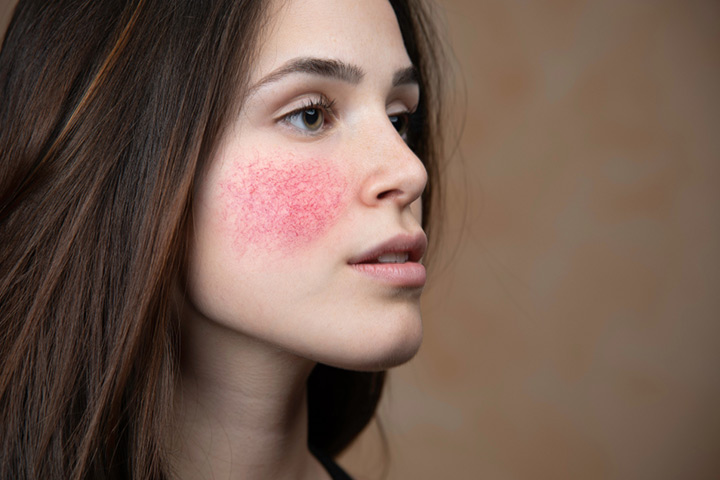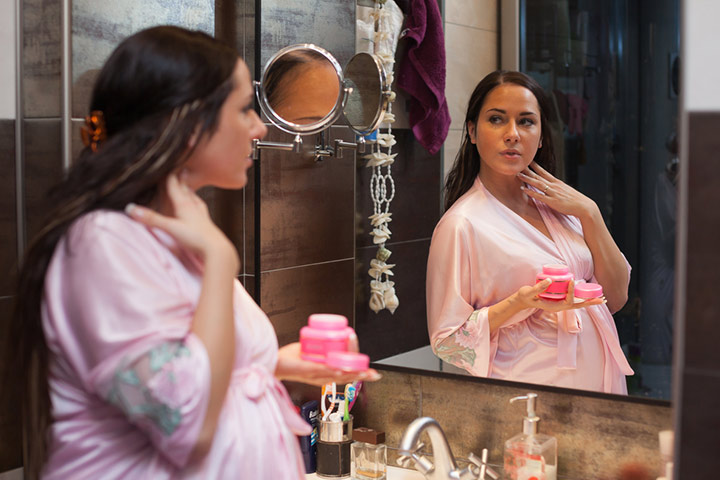
Image: Shutterstock
Pregnancy is often accompanied by a plethora of symptoms, some good and some bad. When we say good, we’re talking about that pregnancy glow, undivided attention, and beautiful hair (to name a few). Then there’s the downside of pregnancy which includes a few pregnancy-related skin problems.
Melasma and rosacea are two skin problems known to show up during pregnancy, and if you’re suffering from either or both, know that you are not the only one! Several expectant mothers complain of these skin problems, which tend to show up or worsen during their pregnancy. It’s easy to confuse the two, so here’s us talking about both, so you can get clarity and understanding as to what you’re dealing with!
What Is Melasma?
If you’ve heard people mention the “mask of pregnancy”, then they’re talking about melasma. Melasma is a skin condition that causes the color-producing cells of your skin (known as melanocytes) to produce excessive amounts of pigment. When this happens during pregnancy, it is known as chloasma. As far as your baby is concerned, you have nothing to worry about as it does not affect your baby, nor does it result in any pregnancy-related complications. However, it is a cosmetic concern, and it may make you uncomfortable and even have an impact on your self-esteem and confidence (1).
Melasma is often characterized by dark splotches or patches, particularly on the cheeks, forehead, chin, and around the corners of your mouth. It usually worsens when you are exposed to the sun. Many women around the world complain of some form of this condition appearing during the term of their pregnancy. The patches may appear in equal symmetry and stay for a while. When you are pregnant, your body is more sensitive and prone to such conditions. Thyroid issues during pregnancy and other stressful factors can also trigger melasma. Even if you are about to step out for some important work, if you are exposed to the sun’s ultraviolet rays for a long period of time, it is very likely to immediately appear.
Do you know how a medical or health expert diagnoses melasma? Though there are multiple testing techniques, one notable one would be light diagnosis. There is a specific light known as transillumination light. It is specifically used to discover and recognize different types of skin infections. The doctor can also find out the number of skin layers that were infected by melasma. Sometimes, if they think the condition is more serious, they are most likely to suggest a biopsy for diagnosis and then its necessary treatment.
What Is Rosacea?
Rosacea is another skin condition that may either worsen during pregnancy or start due to pregnancy. It can also affect people who are not pregnant. It may look like severe acne; however, it is not to be confused with acne. Rosacea can cause your skin to look flushed, with outbreaks and visible blood vessels, along your cheeks and nose. The outbreaks are usually red, pus-filled, and inflamed (2).
The scars on the skin might cause stinginess, and exude heat vapors because of the toxicity. You might feel like your skin is burning and the skin affected with rosacea will feel soft and tender, but not in a good way. Some other extreme forms of rosacea would include ocular ones, which basically means that your eye is the centerpoint of this attack. The skin around your eyes and sometimes eyelids might turn dry, swollen and red, and it is mistaken for conjunctivitis by regular people. Also, if the problem persists, it starts attacking your nose. There is a chance that the nose will increase in size and inflame as the skin on your nose starts becoming thick. But don’t worry ladies, the nose inflammation is more common in men, even though the possibility of it happening to pregnant women is not completely ruled out.
Although the exact cause of rosacea is unknown, certain factors such as extreme temperature, exposure to sunlight, consumption of alcohol and spicy foods, and certain medications are known to make the condition even worse. Even though pregnant women are not allowed to consume these foods, sometimes food cravings can get the better of them. It can also result from a cosmetic that unexpectedly caused a reaction and then aggravated into rosacea. Exposure to any kind of smoke can also be a bad trigger.
Dealing With Skin Problems During Pregnancy
Sometimes, skin problems during pregnancy are inevitable. However, the good news is that most of them disappear soon after your baby is born. Melasma doesn’t always require treatment. Once your hormones get back to normal, the condition fades away. However, if it is persistent, your healthcare provider might prescribe over-the-counter topical creams, as well as sunscreen to protect your skin (3).
Rosacea does not have any known cure, but you can control its symptoms. You can do this by avoiding its triggers such as the consumption of spicy foods and alcohol, certain medications, extreme temperature, and exposure to sunlight, as well as intense exercise and too much stress. Your doctor might prescribe gentle cleansers and mild lotions to reduce inflammation. Medically approved sunscreens are also helpful, particularly when you have to step out. In some cases, if the condition worsens, you may be given long-term oral medications.
Some other recommended medications for these skin outbreaks could be antibiotic skin creams or gels. Sometimes, if the scars have visibly disfigured enough to stop showing your face to anyone, there are creams that act as a cover to hide the marks. For women with Rosacea in particular, eye drops are also recommended to avoid causing harm to the eyes. If the condition gets worse enough to stop your day-to-day functioning, you can consult your dermatologist for a risk-free laser treatment to discard the extra skin tissue on your face.
It’s normal to worry when these skin problems show up. However, know that you’re not alone, and in most cases, this is part and parcel of pregnancy. The good news is that they are not life-threatening to you or your child, and they usually go away after childbirth. What are your thoughts on this? Have you experienced any skin issues during pregnancy? Let us know in the comments below!
References
- Melasma
https://www.ncbi.nlm.nih.gov/books/NBK459271/ - [Acne and rosacea in pregnancy]
https://pubmed.ncbi.nlm.nih.gov/28070633/ - Melasma Treatment: An Evidence-Based Review
https://pubmed.ncbi.nlm.nih.gov/31802394/















